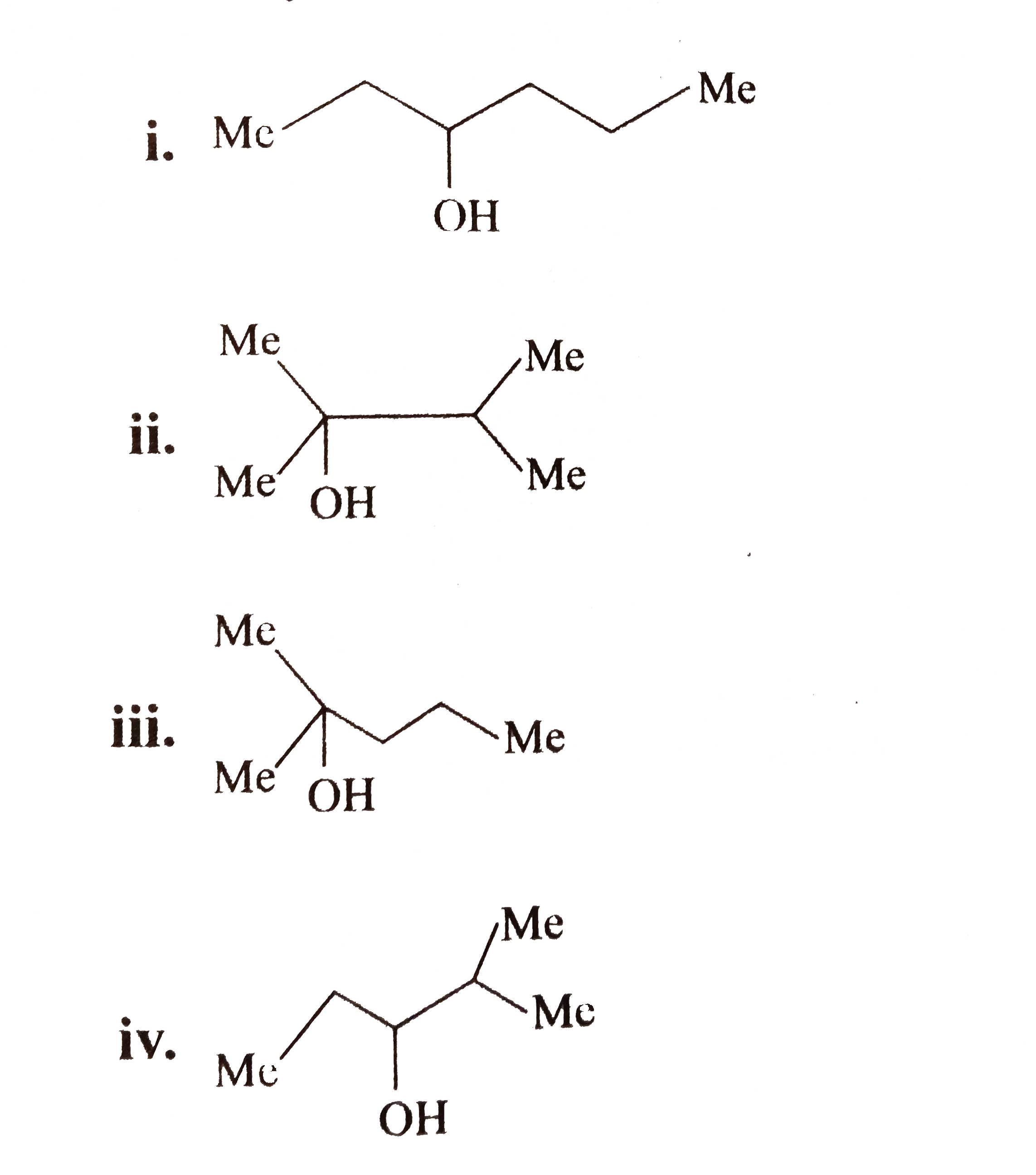Asssertion : (CH3)3COH when heated with conc. H2SO4 gives isobutylene as the main product and not di-tertiary butyl ether.
Reason : All alcohols are radily dehydrated with conc. H2SO4.
If both assertion and reason are correct and reason is correct explanation for assertion.
If both assertion and reason are correct but reason is not correct for assertion.
If assertion is correct but reason is incorrect.
If both assertion and reason are incorrect.
The correct Answer is:c
To solve the question, we need to analyze both the assertion and the reason provided.
Step 1: Understand the Assertion
The assertion states that when tertiary butyl alcohol (C(CH₃)₃OH) is heated with concentrated sulfuric acid (H₂SO₄), it produces isobutylene (C₄H₈) as the main product, rather than di-tertiary butyl ether.
Step 2: Reaction Mechanism
1. Protonation of Alcohol: When tertiary butyl alcohol is treated with concentrated H₂SO₄, the hydroxyl group (-OH) is protonated to form an oxonium ion. This makes the -OH group a better leaving group.
C(CH₃)₃OH+H₂SO₄→C(CH₃)₃OH₂++HSO₄−
2. Formation of Carbocation: The oxonium ion can lose a water molecule (H₂O), leading to the formation of a tertiary carbocation (C(CH₃)₃⁺).
C(CH₃)₃OH₂+→C(CH₃)₃++H₂O
3. Elimination to Form Alkene: The tertiary carbocation can undergo elimination where a hydrogen atom from a neighboring carbon is removed, leading to the formation of isobutylene (C₄H₈).
C(CH₃)₃+→C(CH₃)₂=CH₂+H+
Step 3: Why Not Ether Formation?
Due to steric hindrance around the tertiary carbon, the likelihood of another alcohol molecule attacking the carbocation to form di-tertiary butyl ether is significantly reduced. Instead, the reaction favors elimination to form the alkene (isobutylene).
Step 4: Analyze the Reason
The reason states that "All alcohols are readily dehydrated with concentrated H₂SO₄." This statement is not entirely accurate. While tertiary alcohols do undergo dehydration readily, primary alcohols can form ethers instead of alkenes under similar conditions.
Conclusion
- Assertion: True (Tertiary butyl alcohol gives isobutylene).
- Reason: False (Not all alcohols behave the same way with concentrated H₂SO₄).
The correct answer is that the assertion is correct, but the reason is incorrect.
Final Answer
The assertion is correct, but the reason is incorrect. The correct option is: Assertion is true, Reason is false.
The assertion states that when tertiary butyl alcohol (C(CH₃)₃OH) is heated with concentrated sulfuric acid (H₂SO₄), it produces isobutylene (C₄H₈) as the main product, rather than di-tertiary butyl ether.
1. Protonation of Alcohol: When tertiary butyl alcohol is treated with concentrated H₂SO₄, the hydroxyl group (-OH) is protonated to form an oxonium ion. This makes the -OH group a better leaving group.
C(CH₃)₃OH+H₂SO₄→C(CH₃)₃OH₂++HSO₄−
Due to steric hindrance around the tertiary carbon, the likelihood of another alcohol molecule attacking the carbocation to form di-tertiary butyl ether is significantly reduced. Instead, the reaction favors elimination to form the alkene (isobutylene).
The reason states that "All alcohols are readily dehydrated with concentrated H₂SO₄." This statement is not entirely accurate. While tertiary alcohols do undergo dehydration readily, primary alcohols can form ethers instead of alkenes under similar conditions.
- Assertion: True (Tertiary butyl alcohol gives isobutylene).
- Reason: False (Not all alcohols behave the same way with concentrated H₂SO₄).
The assertion is correct, but the reason is incorrect. The correct option is: Assertion is true, Reason is false.
Similar Questions
Knowledge Check
- Question 1 - Select One
Acetone on heating with conc. H2SO4 mainly gives
AmesityleneBmesityl oxideCtolueneDxylene. - Question 2 - Select One
Acetone on heating with conc. H2SO4 mainly gives
AmesityleneBmesityl oxideCtolueneDxylene. - Question 3 - Select One
Acetone on heating with conc. H2SO4 mainly gives
AmesityleneBmesityl oxideCtolueneDxylene.
Oxalic acid on treatment with conc. H2SO4 gives
View SolutionPredict the product when alcohol
 undergoes dehydration with conc. H2SO4.View Solution
undergoes dehydration with conc. H2SO4.View SolutionMethanoic acid is heated with conc. H2SO4, to form
View SolutionArrange the following alcohols in the decreasing order of
dehydration with conc. H2SO4.
 View Solution
View SolutionEthylene glycol
 on heating with conc. H2SO4 gives mainly :View Solution
on heating with conc. H2SO4 gives mainly :View Solution
